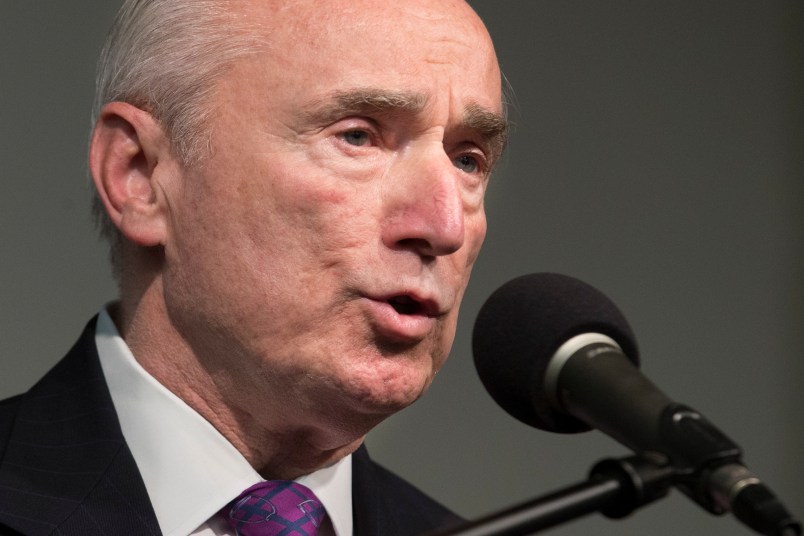NEW YORK (AP) — Sheila Beasley was struggling to clean up after her beloved Rottweiler, Rocky, on a Bronx sidewalk on a December day in 2008 when she briefly put his leash down — a move spotted by a nearby plainclothes police officer who promptly wrote her a summons for having an unleashed dog.
Beasley, a 50-year-old mother of two, said she forgot about the ticket and missed a court date to resolve it. That decision triggered a warrant for her arrest, and nearly three years later, police showed up at her door and hauled her off to jail, where she stayed for four days.
“I feel like they abducted me from my house,” Beasley said this week. “I would never even make up in my wildest dreams and think I would have to go through a system like that for something so insignificant as doggy poop.”
New York’s court system has about 1.2 million open warrants like Beasley’s, affecting people who run the risk of arrest for failing to resolve sometimes decades-old infractions for low-level offenses such as drinking in public or disorderly conduct. And while city officials haven’t yet presented a formal proposal on how to resolve the backlog, Police Commissioner William Bratton has floated one approach that advocates and others are already supporting: amnesty.
“Warrants never go away. There’s no expiration date,” Bratton said in an interview with The Associated Press. “It would be great to get rid of a lot of that backlog. It’s not to our benefit from a policing standpoint to have all those warrants floating around out there.”
How that might happen is unclear, and officials are still talking about the possibilities, but Bratton said he envisions a program in which people with outstanding warrants would receive a notification informing them that their risk of arrest on these matters could disappear if they agree to come forward.
“Will it be feasible? I don’t know,” he said. “But I’m open to discussing it.”
Mayor Bill de Blasio’s criminal justice coordinator, Elizabeth Glazer, said in a statement that officials were investigating “how to safely reduce the number of already outstanding warrants in this city.” Glazer’s office has been spearheading reforms to the summons system, by coordinating police, state court judges and others in an attempt to make the justice system fairer.
The city has experimented with amnesty before, but only on a small scale. Brooklyn District Attorney Ken Thompson, whose office will work with judges to clear old low-level summons cases out of a local church during Father’s Day weekend, said he welcomes any larger plan that “effectively and fairly” settles old cases.
But instituting a broader amnesty program could prove more complicated.
There are five elected district attorneys in New York with the authority to enforce rules as they see fit, and state judges must vacate open criminal warrants even if city officials decide on a policy level to institute an amnesty program.
Officials last month said they were redesigning the physical summons form itself, texting reminders to people ahead of their summons court dates, as well as cutting down court processing times to shrink the number of people who end up in jail for low-level offenses. They’ll also post summons data broken down by race for analysis, a concession to advocates who claim tickets disproportionately target minorities.
Last year, almost 40 percent of the hundreds of thousands of people slapped with tickets for low-level violations forgot, skipped or otherwise failed to show up to court to resolve the summonses.
Other cities have already implemented amnesty programs.
Over a two-month period this year, Atlanta municipal court officials say, more than 2,000 of the roughly 90,000 total people with open warrants resolved their outstanding cases by looking up their warrants online, paying fines and appearing in court in some cases.
Nancy Fishman of the nonprofit Vera Institute of Justice said many people with outstanding warrants are poor, homeless or mentally ill and didn’t show up in court because they didn’t have money to pay fines.
“We want people be to be held accountable to the court system, but sometimes to make things work better we have to find reasonable fixes,” she said.
A reasonable fix for Beasley would have been something other than detention. Her case was ultimately dismissed after a 10-second court appearance following 96 hours in a Bronx court holding cell, and she has since filed a false arrest lawsuit against the city.
“They came banging on my door like they were after some hardened criminal,” Beasley said. “They should have a better system.”







Just stop issuing warrants if the offense isn’t one that would merit jail time in the first place.
The police know they have a problem and want to continue to hold these people accountable - now why would you expect compliance. It would make more sense for the police to use their database to determine how many of those warrants would be dismissed and just do that - why punish people with threat…just take a friendly visit and hope your case is dismissed. NYPD have the data - they need to purge the system of cases/ warrants they know full well should never have been issued in the first place. Including all the OWS cases.
Then who would bother ever showing up in court for them???
New York has a policing policy called Broken Windows involving “quality of life” issues, which indirectly led to Eric Garner’s death for selling cigarettes, and a summons for a dog off leash is just part of that misguided philosophy. In the case of the summons for an off-leash dog, here in San Francisco (which has its own police problems) I rarely let my dog off leash, for her safety and my peace of mind, and if I were ever seen with her off leash, I was asked or told politely to put her back on the leash if a cop was ever near by.
That doesn’t solve the problem of the outstanding warrants.